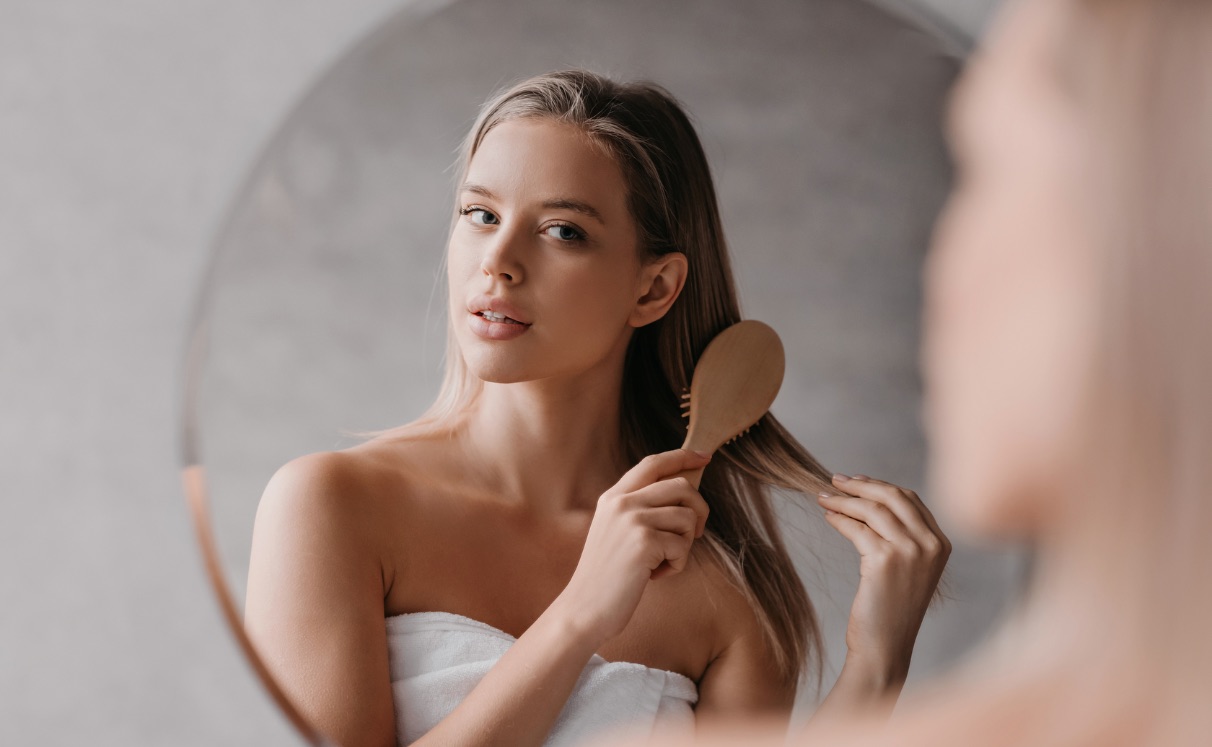Hair Care Routines and Tips for Holidays
Summer, high temperatures, and the sun's omnipresence require special hair care. Learn how to protect your hair during your holidays.
ler mais
Having healthy hair is more than just a matter of aesthetics — it’s a reflection of your overall well-being. After all, your hair frames your face and is a key part of your identity. But maintaining that radiant shine and the soft, healthy feel of your strands does require some care.
Keep reading to uncover the secrets to healthy hair — without compromising on style!
Is it perfect hair? Not quite — because surely you’ve had those difficult hair days when nothing seemed to work, right?
Healthy hair isn’t about perfection. It’s about hair that looks good, but also feels strong, hydrated, and shiny. It’s hair that, whether it’s having a good day or a bad one, still retains the vitality it needs to stand up to the challenges of daily life.
Healthy hair depends on a variety of daily care habits, including:
Balanced diet: What you eat has a direct impact on the health of your hair. Vitamins A, C, E, and B-complex vitamins, along with minerals like iron and zinc, are essential for keeping your hair strong and healthy.
Consistent hydration: Hydration is key to achieving healthy hair, so it’s worth investing in products that keep your strands nourished — especially in drier climates or after using hairdryers and straighteners.
Scalp massages: Gentle massages can help stimulate blood circulation, encouraging hair growth and contributing to healthier hair overall.
Unfortunately, it’s not enough to simply care for your hair — you also need to avoid the factors that can damage it, such as…
Straighteners, hairdryers, and curling irons are excellent tools for creating unique styles, but overuse can compromise hair health, leaving strands brittle and dry. That’s why, before using any heat styling tool, you should apply a heat protectant to keep your hair healthy.
Hair colouring, straightening, and perming can all damage your strands. To maintain healthy hair, avoid repeating these procedures too frequently, and if necessary, invest in treatments that repair the damage.
If you usually focus only on your strands, remember that maintaining healthy hair also means taking care of your scalp. Poor hygiene and product build-up can lead to problems such as dandruff and hair loss.
Now that you know what promotes — and what compromises — hair health, it’s time to explore the best tips for keeping your hair strong, shiny, and healthy.
Using the right hair care products makes all the difference. Before grabbing a shampoo or conditioner, make sure you understand your hair type so you can choose formulas that meet its specific needs and support healthy hair.
If you can’t resist washing your hair every day, pay attention to this tip to keep your hair healthy: overwashing can strip away the natural oils produced by your scalp, leaving your strands dry. That said, if you have oily hair, you can wash it every other day — just avoid very harsh shampoos.
Now, if your hair is normal to dry, washing it two to three times per week is enough. Curly or coily hair? Washing can be even less frequent, and you can even adopt techniques such as co-washing (washing only with a specific conditioner) to help preserve healthy hair.
If you want healthy, beautiful hair — don’t fear the scissors! Regular trims help prevent dreaded split ends and keep your strands stronger and more vibrant. How often should you cut your hair? Ideally, every two to three months, even if it’s just to trim the ends. This small habit goes a long way in keeping your hair healthy.
Set aside hair products that contain a high level of alcohol, such as strong mousses and hairsprays, as they can damage the hair, leaving it dry, fragile, and prone to breakage. To keep your hair healthy, opt for hydrating leave-ins and styling products that protect while helping to shape your style.
If your hair starts becoming weaker, more brittle, or you notice excessive hair loss, take action straight away before the problem worsens.
In most cases, you can reverse the situation and restore your hair’s health with the right hydrating treatments to prevent breakage. However, if the hair loss is severe, you should seek expert help to identify the root cause — whether it’s stress, hormonal imbalance, or genetic factors — and find the best approach to restoring your hair’s strength and beauty.
When hair loss becomes excessive and starts affecting your self-esteem. In such cases, a hair transplant may be an excellent solution — but only if traditional treatments have failed and/or the hair loss is irreversible.
At Master Group, we’re here to help you regain your confidence — and the healthy hair you deserve.